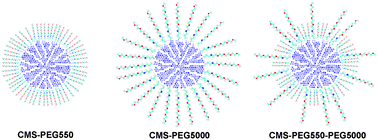Impact of different PEGylation patterns on the long-term bio-stability of colloidal mesoporous silica nanoparticles
28-Sep-2010
J. Mater. Chem., 2010, 20, 8693-8699 published on 28.09.2010
J. Mater. Chem.
Inorganic–organic core-shell mesoporous silicananoparticles have high potential as drug delivery vehicles. They can combine high loading levels of guest molecules in the mesoporous core with an organic shell showing stimuli-responsive controlled release capabilities, high stabilization in colloidal suspension, and biocompatibility. We describe colloidal core-shell mesoporous silica (CMS) nanoparticles with an external coating of a hydrophilic polymer shell (poly(ethylene glycol), PEG). By means of a delayed co-condensation approach, different PEG-silane precursors were added to the CMS synthesis solution after certain time periods during the nanoparticlegrowth. Specifically, three different types of linear PEGylated CMS nanoparticles were obtained, having two different PEG-chain lengths with (i) Mw 550, (ii) Mw 5000, and (iii) a mixture of the latter two (75 mol% of Mw550 and 25 mol% of Mw5000). Samples were characterized by different techniques, showing high surface area and pore volume, an effective coating of the silica nanoparticles with the PEG layer (e.g., 12% w/w of linear PEG5000), and improved monodisperse suspension in water and biological media with respect to the unfunctionalized CMS nanoparticles. The behavior of PEG-coated CMS nanoparticles was investigated in simulated body fluid (SBF) for up to 1 month at 37 °C, with the aim of gaining new insights regarding the stability and bio-degradability of these organic-inorganic hybrid nanoparticles. Depending on the density of the coverage and the chain length of the polymer, the PEG-shell significantly reduces the rate of degradation of silica in SBF. The present study extends the PEGylation approach to develop biocompatible hybrid nanocarriers for drug delivery applications., 12% w/w of linear PEG5000), and improved monodisperse suspension in water and biological media with respect to the unfunctionalized CMS nanoparticles. The behavior of PEG-coated CMS nanoparticles was investigated in simulated body fluid (SBF) for up to 1 month at 37 °C, with the aim of gaining new insights regarding the stability and bio-degradability of these organic-inorganic hybrid nanoparticles. Depending on the density of the coverage and the chain length of the polymer, the PEG-shell significantly reduces the rate of degradation of silica in SBF. The present study extends the PEGylation approach to develop biocompatible hybrid nanocarriers for drug delivery applications.



